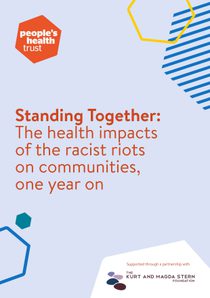Report overview
In the days and weeks after the racist riots that took place in 27 towns and cities across the UK between 30 July and 7 august 2024, People’s Health Trust brought together members of our Network of grassroots community experts working at the frontline of inequality, marginalisation and discrimination, to understand the impact on them and the communities they work with. Our CEO, John Hume wrote more about this blog a few days later.
What we heard then, and again now (through testimony gathered from convening roundtables, conducting interviews and based on survey responses) from over 50 grassroots organisations working in communities directly affected by the racist riots across Great Britain, is stark: Fear, trauma, the detrimental impact on mental and physical health, increasing isolation, and a breakdown of fragile hard-fought for community cohesion as a result of the racist riots.
We know from our regular engagement with our community of grassroots organisations over the last year that the root causes of racist hate and violence are far from tackled. The conditions that led to the racist riots last year are as palpable as ever, and in many areas the situation has deteriorated further.
Some groups of people in communities were and remain more likely to be affected by the racist riots than others – including people seeking asylum and refugees, Muslims, people with learning disabilities, and racialised communities. These groups are also more likely to experience significantly worse health outcomes, and this is further exacerbated by the increasing fear of hate crimes, discrimination, racism and xenophobia.
Many we heard from described it as ‘when, not if’ racist riots would occur again, with the majority telling us that the people they work with locally are ‘likely’ or ‘very likely’ to experience racist violence in the near future.
Therefore, if we are to understand the conditions that led to these events, the impacts on people’s health, and the ways that racist violence like this can be prevented from happening in the future, it’s vital to hear directly from people working on the front line in communities across Great Britian – both where the racist riots occurred, and where they were prevented or avoided. That is what this report seeks to do.

Key findings
- The health impacts of the racist riots on local people affected were immediate and severe, particularly in terms of stress, anxiety and fear.
- The health impacts have also been longer-lasting, exacerbated by an increasingly hostile environment for racialised communities in the year since the racist riots. For some people, the long-term impact of threat and dread, hyper vigilance, and stress is contributing to physical health problems as well as worsening mental health.
- Little has changed for the better, and a lot has got worse, at a national or local level in relation to the conditions that led to the racist riots. The increasingly hostile environment, driven by disengagement, social media-fuelled misinformation and harmful political rhetoric, is causing and accelerating racist violence and hate in many local communities across Great Britain.
- The austerity policies of previous governments, the ongoing impact of Covid-19, and the cost-of-living crisis affecting many communities, are cited as creating the conditions for dissatisfaction and anger. Many noted that “austerity is pitting different groups against each other”, fuelling a desire to “take it out” on people who are seen as different, and “scapegoating migrants for country's economic problems”.
- The impacts of the racist riots have been felt by people right across Great Britain, especially in communities experiencing some of the highest levels of poverty and health inequality, both where the riots took place and where they were prevented or avoided.
- Nearly two-thirds (62%) of the grassroots organisations we heard from think people they work with are ‘likely’ or ‘very likely’ to experience racist hate crime and violence in the near future – indeed, many told us this was ‘ongoing daily’. Only 4% thought it was ‘very unlikely’ in their area.
- Racialised communities, and people experiencing other forms of discrimination and marginalisation, including people with learning disabilities, have been particularly impacted by the racist riots.
- Many respondents highlighted the impact on Muslim girls and women, who have experienced a combination of Islamophobia, racism and misogyny, resulting in verbal and physical attacks, humiliation, fear, anxiety, being scared to leave home or let their children go to school.
- Many young people, particularly those from racialised communities, have experienced negative impacts at school and in public spaces – leading to increased isolation in their homes.
- The health impacts on staff and volunteers in grassroots organisations operating at the front line have been highly damaging, and many are facing direct threat to personal security because of the services they provide. This, in turn, will affect the services they can provide to those who need them most.
- In places that avoided racist riots last summer, the crucial importance was noted of partnerships involving locally trusted, grassroots community organisations working with institutions such as schools, the police, and local councils, and health services.
Media Coverage
Standing Together: The health impacts of the racist riots on communities, one year on has been covered in the following outlets
- The Guardian
- ITV News Granada
- Manchester Evening News
- Huffington Post
- Third Sector
- Civil Society - launch of report
- Civil Society - reference to report in piece on NGOs reaction one year on from riots

Download
Standing Together: The health impacts of the racist riots on communities, one year on
Download